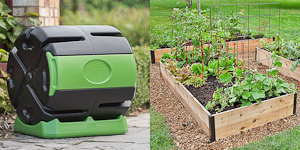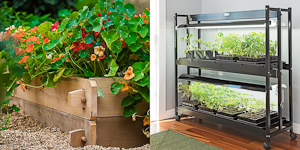- Home
- How to Grow Vegetables A-Z
- How to Grow Onions
How to Grow Onions
This article covers the basics of how to grow onions, including what types of onions to grow in your region, as well as their soil and water requirements, with links to articles on onion bolting, harvesting onions and storing onions.
How to Grow Onions: How Day Length Affects Onions
|
Now onions, it turns out, are super sensitive to day length, so learning how to grow onions successfully requires knowing a bit about how the earth is oriented in space. (Really? That's crazy!) We just need to know that:
|
In the Southern Hemisphere
For my readers in the southern hemisphere: What is says on the left is upside down! Of course days get longer up to Dec 21, and summer days are longer in the south than in the north. Just invert the onion-recommendation latitude numbers, and please forgive me my "northerncentricity". My sweetie Tito is from Chile, and we're always joking about which way is "up". |
Different onion varieties fall into one of three types: short-day, intermediate-day, and long-day. If you want to grow bulb onions, nice large onions that will store well, the #1 most important thing is to choose the correct type for your latitude, or how far north or south you are. Seed catalogs will describe which type their different varieties are.
Long-day onions
- Need a day length between 14-16 hours before they'll start forming bulbs.
- Grow best across the northern tier (about 40°N latitude and northward)
- Store really well over the winter.
Intermediate-day onions
Short-day onions
- need a day length between 10-12 hours before they'll start forming bulbs.
- grow best across the southern tier (about 35°N latitude and southward).
Onions focus on growing green upper growth when it’s still cool and the days are shorter, and focus on developing their bulbs after it gets warm and the days lengthen.
Each layer of a growing onion bulb is the base of a green shoot up top, so the more green top growth an onion makes before it gets warm, the bigger the bulbs will be.
How to Grow Onions: Soil and Fertilizer
Onions absolutely need nice loose, friable soil in order to be able to expand into good-sized bulbs, and my recommendation is the same as always: compost, compost, compost. Lots and lots of high-nitrogen compost. If you don't make your own, buy bags of a good-quality, diverse-ingredient compost from the nursery to amend your soil.
Onions also like a good organic fertilizer blend at first, while they are working on their green growth. Work a little blood or feather meal into the soil to provide the nitrogen they need for their green growth. Onions will also get off to a fast start if you can give them a little phosphorous in the form of bone meal, which will help their initial root growth. DO NOT fertilize onions after the weather warms and they are nearing their bulb-forming stage.
How to Grow Onions: Watering and Diseases
Since most onion diseases are caused by fungus or water-requiring bacteria, and since onions do not like to dry out, the best compromise is to use surface-level drip irrigation, which keeps the plants evenly watered but keeps the leaves dry. Onions also need good drainage.
Onions especially need consistent water when they start forming bulbs, both because bulbs are juicy and because the soil needs to be moist enough for them to be able to push it aside easily.
Weed control is very important for onions. Keep them weeded by hand when they are little, and after they are well established put down some straw or loose leaf mulch on the surface. Waiting to do this until they are well established will help prevent fungus diseases from taking hold. If you can spray with actively-aerated compost tea you’ll also help them with disease resistance.
Read more about growing onions in these related articles:
- Types of Onions
To grow large bulb onions it’s very important to choose types of onions that match how far north or south you live, because onions need to experience a certain day length before they switch from growing green tops to forming bulbs. Find out which types (and varieties) will work for you! - Planting Onions
All about planting onions: how deep and how far apart to plant, the difference between growing from seed, onion sets or onion transplants, and when to plant onions for maximum bulb growth. - Growing Onions from Seed
There are some advantages to starting your own onions from seed, but you’ll need to start them indoors in order to get a jump on the season and give your onions enough time to develop bulbs. Find out how and when to plant, and when to transplant outside. - Onion Diseases
Most onion diseases are a lot easier to prevent than to cure. Learn 5 ways to prevent onion diseases, and find out what to do if your plants do become sick. - Onion Bolting
Onions will send up a flower stalk if they become stressed, which takes energy away from growing nice large bulbs. Learn how to prevent onion bolting, and what to do if onions do start to go to seed. - Harvesting Onions
Make sure to wait for harvesting onions until the tops start turning brown. Learn the proper way to harvest and cure onions for the most successful winter storage. - Storing Onions
There are several cool and clever ways to store onions, but the most important things are to provide excellent air circulation and to keep them dry. Read about tips and tricks for storing onions.
Help share the skills and spread the joy
of organic, nutrient-dense vegetable gardening, and please...
~ Like us on Facebook ~
Thank you... and have fun in your garden!
Affiliate Disclaimer
This website contains affiliate links to a few quality products I can genuinely recommend. I am here to serve you, not to sell you, and I do not write reviews for income or recommend anything I would not use myself. If you make a purchase using an affiliate link here, I may earn a commission but this will not affect your price. My participation in these programs allows me to earn money that helps support this site. If you have comments, questions or concerns about the affiliate or advertising programs, please Contact Me.Contact Us Page



